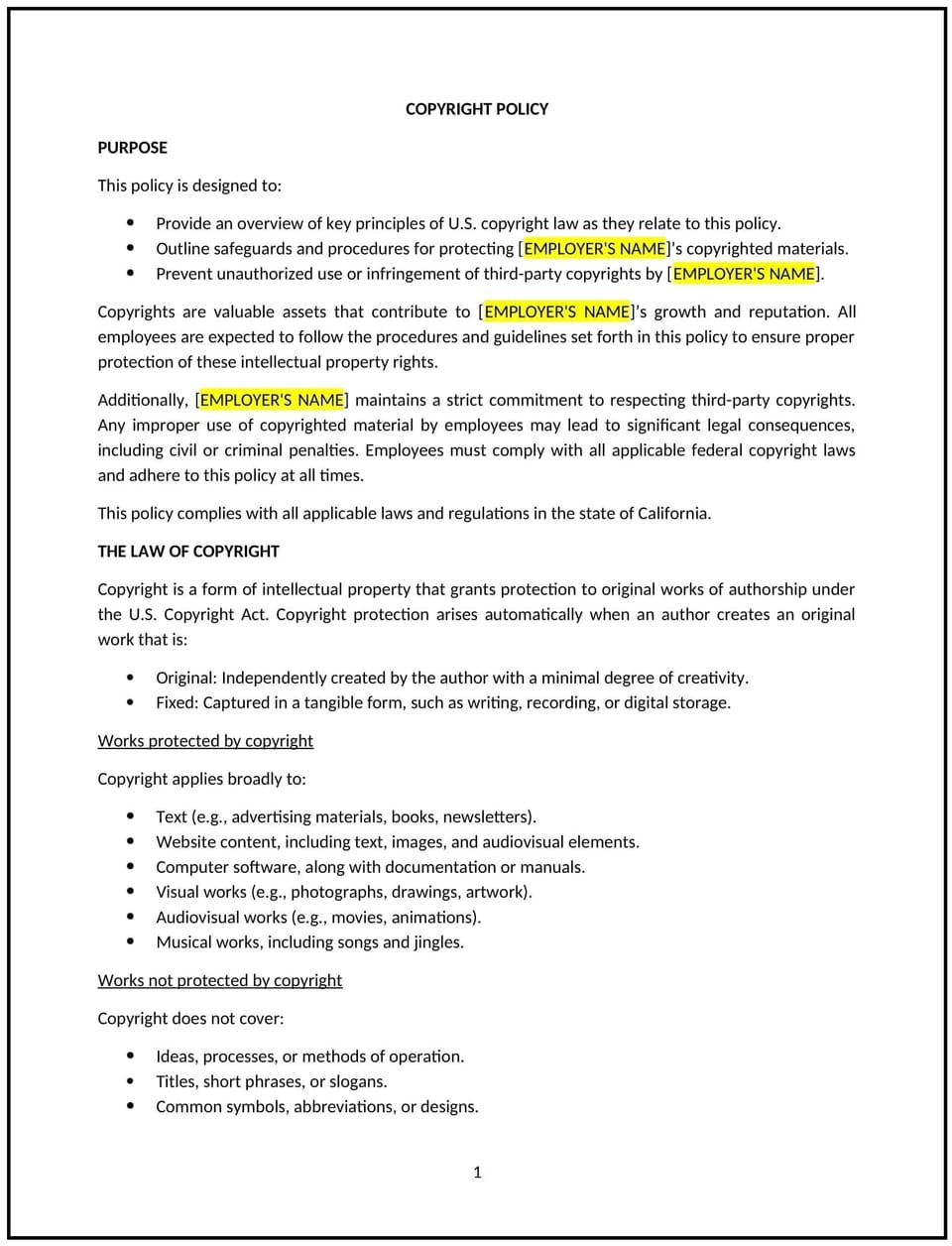Copyright policy (California): Free template

Copyright policy (California)
In California, a copyright policy provides businesses with guidelines for respecting intellectual property rights and ensuring compliance with federal and state copyright laws. This policy aims to prevent copyright infringement and addresses the use of copyrighted materials within the workplace, including software, written works, and multimedia.
By implementing this policy, California businesses can protect themselves from legal risks related to copyright violations, foster a culture of respect for intellectual property, and ensure that employees are aware of the importance of copyright compliance.
How to use this copyright policy (California)
- Define copyrighted materials: Specify what types of content are protected under copyright law, including software, music, videos, artwork, and written works.
- Communicate usage guidelines: Outline how employees can legally use copyrighted materials, such as obtaining licenses or using materials under fair use provisions.
- Establish procedures for obtaining permission: Provide clear steps for obtaining permission or licenses before using copyrighted materials in business operations or marketing.
- Address consequences of infringement: Clearly state the consequences for employees who violate copyright laws, such as disciplinary actions or termination.
- Promote awareness: Offer training sessions to educate employees about copyright laws and proper usage to avoid violations.
Benefits of using this copyright policy (California)
This policy offers several advantages for California businesses:
- Supports compliance: Reflects federal copyright law and California state regulations, minimizing legal risks associated with intellectual property misuse.
- Protects business interests: Safeguards the business from legal disputes or financial penalties resulting from copyright infringement.
- Enhances professionalism: Demonstrates the business’s commitment to respecting intellectual property rights and avoiding unlawful practices.
- Encourages fair use: Provides guidelines for employees to use copyrighted materials appropriately under fair use or licensing agreements.
- Reduces risks: Minimizes the potential for costly lawsuits or reputational damage resulting from copyright violations.
Tips for using this copyright policy (California)
- Reflect California-specific laws: Ensure compliance with both federal copyright law and any California-specific regulations regarding intellectual property.
- Use clear contracts: Formalize licensing agreements or contracts with third parties to avoid misunderstandings regarding copyrighted content.
- Train employees: Educate staff about copyright law, fair use provisions, and the importance of protecting intellectual property.
- Monitor usage: Regularly review how copyrighted materials are used within the business and ensure all content is properly licensed or attributed.
- Update regularly: Revise the policy to reflect changes in California laws, business needs, or emerging copyright-related issues.
Q: How does this policy benefit the business?
A: This policy supports compliance with copyright laws, reduces the risk of legal disputes, and promotes ethical use of intellectual property.
Q: What types of materials are covered under this policy?
A: The policy covers all types of copyrighted works, including software, written content, music, films, and any other materials protected by copyright law.
Q: How does this policy support compliance with California laws?
A: The policy reflects federal and California copyright laws, ensuring that employees understand the proper handling and use of copyrighted materials in the workplace.
Q: What steps should employees take to use copyrighted materials legally?
A: Employees should obtain proper licenses, use materials within the scope of fair use, or seek permission from the copyright owner before using the materials in business operations.
Q: What happens if an employee violates this policy?
A: Violations may lead to disciplinary actions, including warnings, suspension, or termination, depending on the severity of the infringement.
This article contains general legal information and does not contain legal advice. Cobrief is not a law firm or a substitute for an attorney or law firm. The law is complex and changes often. For legal advice, please ask a lawyer.


